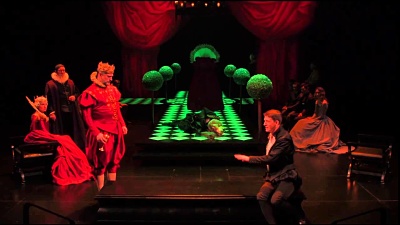Laurence Olivier’s 1948 film of Hamlet opens with a prologue of text taken from later in the play, and then, at the behest of studio executives, one spoken line: “This is the tragedy of a man who could not make up his mind.” Today, Olivier’s conception of Hamlet: The Procrastinator’s Tragedy is mostly treated as a joke, but Hamlet’s state of crippling indecision genuinely was once seen as the play’s central force, the main character’s fatal tragic flaw.
These days, we like our Hamlets to be a little more dynamic. But the prospect of encapsulating the entire play and its history of interpretations into a snippet that can be tweeted or put up on a poster is still a bit daunting. It’s easy enough to drum up a paragraph to remind potential audience members that this is the one in Denmark with the mad prince and the drowned girl. But how do you concisely articulate what it’s about on a thematic level? Particularly when it’s highly likely that everyone in your company has their own answer to that question?
That is, after all, one of the things that makes Shakespeare so great and so enduring (assuming, of course, you think that there’s a reason we still produce these same darn plays, which I happen to): Three different readers can come away with three different understandings of the play’s meaning and purpose. Or five. Or maybe 10. Unfortunately, you can’t really have 10 different, potentially contradictory taglines.
So what is Hamlet about? Judging by the way several theatres have answered the question in recent and upcoming promotional copy, this is far from a settled matter.
It’s a Mystery?
“A ghostly visitor with a shocking secret, a daughter devastated by loss, a deadly duel—and the most famous question in all of drama.”
—Stratford Festival, 2015
“Forced by circumstance into a world turned upside down by betrayal, distrust and madness, Hamlet spirals through a torrent of erratic emotion and bizarre behavior in a relentless pursuit of truth.”
—Great Lakes Theater, 2017
How can we forget what we already know about Shakespeare? Even people who only remember the SparkNotes version of Hamlet remember the answer to what could be thought of as the play’s central quandary: Did the new king really kill his brother? I suspect that even audience members completely unfamiliar with the play would know enough about storytelling to assume that ghosts tell the truth.
Is it possible to create a version of Hamlet that casts the title character’s various schemes in the early acts not as procrastination, a la Olivier, but as genuine uncertainty that the audience can invest in rather than judge? That is, can Hamlet actually be a mystery? This reading is kinder to Hamlet himself than Olivier’s is, as it not only suggests that his apparently inactivity is in fact focused seeking but also casts him in the role of sleuth, a particularly appealing position in our post-Serial era of true crime obsession.
It’s About Death

“The searing tragedy of young student Hamlet, tormented by his father’s death and confronting each of us with the mirror of our own mortality in an imperfect world.”
—Royal Shakespeare Company, 2016
“Grand in scope, rich in language, this classic story of haunting, both literal and metaphorical, ranks among Shakespeare’s masterpieces.”
—Oregon Shakespeare Festival, 2016
“When his father’s ghost rises to demand retribution, Hamlet is put in an impossible situation…Hamlet’s tragic tale of revenge gets the full-on, terrifying—and bloody—treatment.”
—Hartford Stage, 2016
Hamlet and Hamlet have a reputation for being contemplative and melancholy that can seem at odds with the body count that both famously amass. But this contrast is also illustrative of the way death pervades the play on every level and in almost every form: from murder to mourning, from fearing it to longing for it. These are potent ideas, and leaning on them emphasizes many of the play’s juiciest elements: its thoughtfulness, its complexity, and of course its violence.
But there’s danger, too, in playing too far into a somewhat simplistic reputation: that both play and protagonist may be preoccupied with death. The play itself is far from unrelentingly gloomy and cerebral, nor is it a continually action-packed bloodbath. What friends of mine who don’t see much Shakespeare are consistently surprised by in Hamlet is its humor. With Shakespeare, as with any play with a strong reputation, it’s hard to know if such lesser-known contours are best left a surprise, or if downplaying them risks losing audience members who assume they already know what they’re in for, and who thus dismiss a play that has much more to offer than they realize.
It’s About the Leading Man
“As a country arms itself for war, a family tears itself apart.”
—Barbican Centre, whose Hamlet was Benedict Cumberbatch, 2015
“‘To be, or not to be? That is the question.’ Generation after generation of great actors have gone on to give their own unique and personal answer to Hamlet’s most famous query.”
—Classic Stage Company, Peter Sarsgaard, 2015
“ghost / devil
acting / madness
be / not be”
—Almeida Theatre, Andrew Scott, 2017
I think I’ll be forgiven for saying that if Hamlet isn’t particularly fresh in your memory, none of these taglines are going to help you very much. Hamlet is often used as a vehicle to showcase stars, and sometimes for making them. In the former case, you’re probably not selling Hamlet as much as the Hamlet you’ve got.
There is power and danger in this strategy, as New York City theatres especially seem to have to relearn every few years: Sure, a celebrity cast can be an exciting way to get people who are not habitual theatregoers into seats, but sometimes it feels like far less thought has been given to making sure the thing they see there will make them ever want to return. As these taglines’ relative unconcern with explaining what Hamlet is actually about suggest, it’s easy to forget, when focusing on the star, that there’s more to the play than just the title character.
(To be clear, this is not specifically a commentary on any of the productions above, none of which I’ve seen.)
It’s About Politics

“Struggling to make sense of the new order, Hamlet faces a crossroad. He can consent, or rage against the injustice around him.”
—Seattle Shakespeare, 2016
“This immortal story of how unchecked corruption leads to a darkened world has never felt more relevant.”
—Public Mobile Unit (via Twitter), 2016
Reading through all of these descriptions, I’m beginning to think that the producers of Shakespeare can be divided into a) those who want to emphasize poetry and timelessness, and b) those who want to draw attention to a play’s contemporary relevance. Of course, many places—like the Mobile Unit above—draw upon a bit of both elements, but both of these taglines take an overall tone that is pointedly contemporary and pointed. Though neither actually uses the word “politics,” “injustice” and “corruption” feel inescapably weighted at this moment.
Vague statements about Shakespeare’s supposed universality risk playing into the still powerful artistic myth that whiteness and maleness are universal while anything else is specific. But trying to articulate the connections in more detailed and contemporary language often sounds slightly off-key, as the political dynamics of Shakespeare’s hereditary monarchies rarely map quite as seamlessly onto 21st-century American life as they may appear to at first glance. Of course Shakespeare isn’t devoid of contemporary political or social import, but as with all of the above categories, such comparisons are so much more slippery than they seem.
I should close by saying that I can imagine almost nothing more artistically horrifying than being asked to pin down a Shakespeare play in one or two catchy sentences. And having to publicize what amounts to a thesis statement about the meaning of a play feels so contradictory to an artistic process that is otherwise dedicated to challenging and picking apart one’s initial assumptions. But of course, this trickiness is what makes looking at them so interesting. If pressed, if forced to come up with an encapsulation, what does a company say? As we read through the results, the little mental jolts of “yes, exactly!” or “what the heck?” can provide an exciting and unexpected window into our own assumptions.
And though I understand the laments of those who are frustrated by Shakespeare’s ubiquity, how can we be finished with a play when 10 different productions have 10 different understandings of what that play is?
Seriously, what is Hamlet about?
Hailey Bachrach is a dramaturg who studied Shakespeare at King’s College London, and now works as a marketing associate for Parachute Strategies in Portland, Ore.

